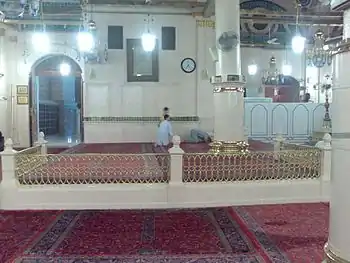Suffah
Al-Ṣuffah (Arabic: الصُّفّة) or Dikkat al-ʻAghawāt (دكة الأغوات) was a shelter that was available at the rear side of Al-Masjid an-Nabawi during the Medina period (622-632) of early Islam. It was initially available at the northeastern corner of the mosque and Muhammad ordered it to be covered by palm leaves in order to provide shade, hence it was called Al-Suffah or Al-Zullah (الظلة); i.e. the shade.[1] It was moved several decades later into another place in the mosque during an expansion project.

Homeless and unmarried muhajirun (companions of Muhammad who migrated from Mecca) who did not have relatives in Medina, dwelt in al-Suffah where they were mainly learning the Quran and sunnah. These people were called "Ashab al-Suffah", which translates to "Suffah Fraternity".
Muhammad used to sit with them, chat together, and used to call them to his food, sharing together his drinks, so they were counted as his dependants. Companions of the Prophet used to take two or three of the Ashab al-Suffah to feed them at home and used to select the best dates and hang them in al-Suffah's ceiling for meals.
Due to the scarcity of jobs caused by a combination of trade boycott and military threat,[2] members of Ashab al-Suffah had little income. It is estimated that al-Suffah held up to 300 people at a time, but they were merely increasing and decreasing in numbers.[3] They could have reached about 400 total members, and it lasted about nine years till they became rich before the death of Muhammad. Later, every one of them became a ruler or an emir.
Location
The Suffah was originally situated in the north-east corner of the Mosque. When Muhammad was ordered by Allah to change the Qibla (prayer direction) to be towards Mecca at the South of Medina, the Suffah was left at the rear of the mosque, where it remained.
When Al-Walid ibn Abd al-Malik, the Umayyad Caliph, expanded the mosque, Al-Suffah's location was changed to where it is now called: Dikkat Al-Agawat.
The most prominent member of Ashab al-Suffah was Abu Hurairah, as evidenced by Hadith. Members studied Sharia or Quran from Muhammad or from someone directly assigned by him. During wartime, those who were capable joined the army.
See also
References
- Richard A. Gabriel (22 October 2014). Muhammad: Islam's First Great General. University of Oklahoma Press. pp. 25–. ISBN 978-0-8061-8250-6.
- "Ahl Al Suffah أهل الصفة". Islamic Encyclopedia. 13 October 2014. Retrieved 14 March 2017.
- "Ashab us-Suffah platform". Islamic Landmarks. Retrieved 2016-03-11.
